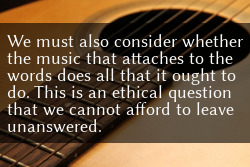What Do the People Love?
Body
“Augustine’s statement, though, is a very powerful instrument for understanding a nation or a culture: What do the people love? I would say that the object of love for Americans, historically, has been freedom….There is nothing wrong with loving these things, but, St. Augustine would say, unless the people also love God, their lesser loves can lead them astray.” - Veith

 One of the things that always amuses me about being a pastor’s wife is that people think they have to be careful around me. As if I have a delicate condition that can’t handle the realities of the world. In order to protect me, they shuffle, they fumble, they apologize and then use euphemisms to describe situations that I could paint in living color. What they don’t understand is that, behind this genteel exterior, I’ve seen it all.
One of the things that always amuses me about being a pastor’s wife is that people think they have to be careful around me. As if I have a delicate condition that can’t handle the realities of the world. In order to protect me, they shuffle, they fumble, they apologize and then use euphemisms to describe situations that I could paint in living color. What they don’t understand is that, behind this genteel exterior, I’ve seen it all. Reposted, with permission, from
Reposted, with permission, from  The following is an excerpt from a series of essays entitled “Towards Conservative Christian Church” (parts 17 and 18). The series continues at
The following is an excerpt from a series of essays entitled “Towards Conservative Christian Church” (parts 17 and 18). The series continues at 
 The Lincoln memorial in Washington
The Lincoln memorial in Washington 
Discussion